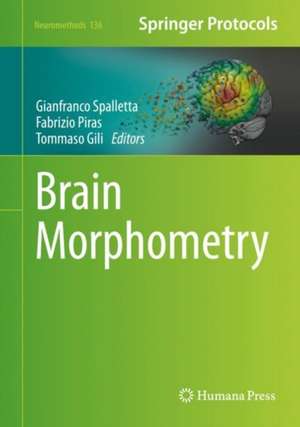Brain Morphometry: Neuromethods, cartea 136
Editat de Gianfranco Spalletta, Fabrizio Piras, Tommaso Gilien Limba Engleză Hardback – 2 mar 2018
This volume presents the latest methods and approaches used to better characterize the properties of the structural human brain, and also explores various dysfunctional and non-dysfunctional neuroanatomical variations. This book is divided into 3 parts: methods, non-clinical applications, and clinical applications. The chapters in Part 1 talk about methods to study cortical thickness and the general linear model. Part 2 covers changes in brain structure from birth to adulthood, and morphometry of the corpus callosum. Part 3 discusses applications to study Alzheimer’s Disease, Parkinson’s Disease, epilepsy, Schizophrenia, and suicide. In Neuromethods series style, chapters include the kind of detail and key advice from the specialists needed to get successful results in your laboratory.
Cutting-edge and comprehensive, Brain Morphometry is a valuable resource for students, clinicians, and researchers who are interested in this developingfield.
Din seria Neuromethods
- 5%
 Preț: 347.57 lei
Preț: 347.57 lei - 15%
 Preț: 659.53 lei
Preț: 659.53 lei - 15%
 Preț: 665.08 lei
Preț: 665.08 lei - 18%
 Preț: 986.63 lei
Preț: 986.63 lei - 24%
 Preț: 852.89 lei
Preț: 852.89 lei - 18%
 Preț: 953.03 lei
Preț: 953.03 lei - 18%
 Preț: 955.25 lei
Preț: 955.25 lei - 20%
 Preț: 1129.36 lei
Preț: 1129.36 lei - 20%
 Preț: 1252.04 lei
Preț: 1252.04 lei - 18%
 Preț: 1291.45 lei
Preț: 1291.45 lei - 15%
 Preț: 652.31 lei
Preț: 652.31 lei - 18%
 Preț: 955.70 lei
Preț: 955.70 lei - 23%
 Preț: 705.39 lei
Preț: 705.39 lei - 18%
 Preț: 973.38 lei
Preț: 973.38 lei - 18%
 Preț: 964.86 lei
Preț: 964.86 lei - 18%
 Preț: 968.03 lei
Preț: 968.03 lei - 15%
 Preț: 662.95 lei
Preț: 662.95 lei - 15%
 Preț: 646.43 lei
Preț: 646.43 lei - 15%
 Preț: 649.71 lei
Preț: 649.71 lei -
 Preț: 395.29 lei
Preț: 395.29 lei - 19%
 Preț: 580.67 lei
Preț: 580.67 lei - 19%
 Preț: 584.12 lei
Preț: 584.12 lei - 19%
 Preț: 566.41 lei
Preț: 566.41 lei - 15%
 Preț: 652.17 lei
Preț: 652.17 lei - 15%
 Preț: 655.13 lei
Preț: 655.13 lei - 18%
 Preț: 959.36 lei
Preț: 959.36 lei - 15%
 Preț: 652.49 lei
Preț: 652.49 lei - 15%
 Preț: 649.54 lei
Preț: 649.54 lei - 15%
 Preț: 649.87 lei
Preț: 649.87 lei - 15%
 Preț: 650.19 lei
Preț: 650.19 lei - 15%
 Preț: 648.42 lei
Preț: 648.42 lei - 18%
 Preț: 1039.22 lei
Preț: 1039.22 lei - 18%
 Preț: 963.15 lei
Preț: 963.15 lei
Preț: 752.73 lei
Preț vechi: 917.97 lei
-18% Nou
Puncte Express: 1129
Preț estimativ în valută:
144.03€ • 150.79$ • 119.18£
144.03€ • 150.79$ • 119.18£
Carte tipărită la comandă
Livrare economică 05-19 aprilie
Preluare comenzi: 021 569.72.76
Specificații
ISBN-13: 9781493976454
ISBN-10: 1493976451
Pagini: 455
Ilustrații: XVI, 534 p.
Dimensiuni: 178 x 254 x 36 mm
Greutate: 1.17 kg
Ediția:1st ed. 2018
Editura: Springer
Colecția Humana
Seria Neuromethods
Locul publicării:New York, NY, United States
ISBN-10: 1493976451
Pagini: 455
Ilustrații: XVI, 534 p.
Dimensiuni: 178 x 254 x 36 mm
Greutate: 1.17 kg
Ediția:1st ed. 2018
Editura: Springer
Colecția Humana
Seria Neuromethods
Locul publicării:New York, NY, United States
Cuprins
Registration.- Convolutional Neural Networks for Rapid and Simultaneous Brain Extraction and Tissue Segmentation.- Cortical Thickness.- Surface and Shape Analysis.- The General Linear Model: Theory and Practicalities in Brain Morphometric Analyses.- Relating High-Dimensional Structural Networks to Resting Functional Connectivity with Sparse Canonical Correlation Analysis for Neuroimaging.- Source Based Morphometry: Data-Driven Multivariate Analysis of Structural Brain Imaging Data.- Integrating Cytoarchitectonic Probabilities with MRI-Based Signal Intensities Calculate Regional Volumes of Interest.- Morphometry of the Corpus Callosum.- Morphometry and Development: Changes in Brain Structure from Birth to Adult Age.- Morphometry in Normal Ageing.- Morphometry and Genetics.- Multicentre Studies of Brain Morphometry.- Brain Morphometry: Alzheimer’s Disease.- Structural MRI in Neurodegenerative Non-Alzheimer’s Dementia.- Brain Morphometry: Parkinson Disease.- Brain Morphometry in Multiple Sclerosis.- Brain Morphometry: Epilepsy.- Brain Morphometry: Schizophrenia.- Brain Morphometry: Bipolar Disorders.- Voxel-Based Morphometry Imaging Studies in Major Depression.- Brain Morphometry: Suicide.- Morphological Brain Alterations in Patients with Obsessive-Compulsive Disorder.- Personality is Reflected in Brain Morphometry.- Brain Morphometric Techniques Applied to the Study of Traumatic Brain Injury.
Textul de pe ultima copertă
This volume presents the latest methods and approaches used to better characterize the properties of the structural human brain, and also explores various dysfunctional and non-dysfunctional neuroanatomical variations. This book is divided into 3 parts: methods, non-clinical applications, and clinical applications. The chapters in Part 1 talk about methods to study cortical thickness and the general linear model. Part 2 covers changes in brain structure from birth to adulthood, and morphometry of the corpus callosum. Part 3 discusses applications to study Alzheimer’s Disease, Parkinson’s Disease, epilepsy, Schizophrenia, and suicide. In Neuromethods series style, chapters include the kind of detail and key advice from the specialists needed to get successful results in your laboratory.
Cutting-edge and comprehensive, Brain Morphometry is a valuable resource for students, clinicians, and researchers who are interested in this developingfield.
Caracteristici
Includes cutting-edge methods and protocols Provides step-by-step detail essential for reproducible results Contains key notes and implementation advice from the experts
